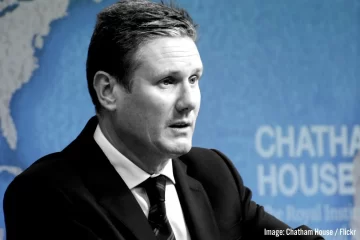We are in the midst of a crisis that will echo throughout history, a period that will define the 21st century. Not since World War II has the future looked so uncertain. World leaders are looking more inept by the day, planning in terms of days and weeks as opposed to the previous years or decades. Now, in the present crisis more than ever, people are beginning to see the failures and fragilities of the systems which intersect and shape our lives. Abundantly clear is how economically unprepared we are for this pandemic.
As any news report will tell you, there is a massive lack of ventilators, masks and test kits; the essential tools needed to tackle the COVID-19 crisis are not available and are not being produced at the rate required to stop mass infection. This is puzzling, as we live at a time where the production of such goods can be carried out at relative ease; the means to combat this epidemic exist, they just aren’t being utilised. The question is why?
Well to put it simply, capitalism cannot distribute resources effectively, and this becomes particularly clear in times of crisis. It is not profitable to ensure that everyone is tested. It is not profitable to ensure that all hospitals have as many ventilators and face masks as required. The future profits of companies are threatened by the attempt to provide such lifesaving treatment. Take, for example, how the medical device manufacturer Intersurgical threatened to sue Italian volunteers who 3D printed ventilator valves for $1 and only stopped after being publicly shamed. These valves, which Intersurgical sells for $11,000, are vital for coronavirus treatment, but to them, their profit margins reigned supreme.
At the same time, the Federal Reserve pumped $1.5 trillion into the stock market to ‘help calm’ investors’ fears, while many hospitals are lacking the basic resources they require. It is, therefore, no surprise that #NotDying4WallStreet was trending on Twitter, as people expressed anger at seeing the Trump administration try to inflate stock prices while downplaying the severity of the virus, and telling their workers to continue business as usual. Worst of all, governments are shovelling out billions of dollars to have exclusive access to new vaccines, preventing their use in less affluent countries. A lack of international coordination, and the capitalist class’ relentless drive for profits, has undermined efforts to stop the pandemic from spreading.
We should not, however, spend too much of our time criticising individuals or individual companies, however much they deserve it. Profit is the sole driving force behind the capitalists’ operations. As Marx wrote, the capitalist is best understood “as capital personified and endowed with consciousness and a will”. Furthermore, crisis should not be explained merely by bad decisions by individuals. These ‘bad’ decisions (as far as social need is concerned) reflect the desperate scramble to keep business as usual, where the wealth produced in society lines the pockets of the ruling class.
This fundamental drive of the capitalists makes them view this pandemic as a profitable venture. Believe it or not, even far-sighted politicians understand this. That’s why they have introduced regulatory measures. Our Tory government has banned the export of 80 drugs, acknowledging that they would otherwise be bought on the cheap, hoarded, and sold at exorbitant prices.
The problem with our current system is that it makes the cooperation required to effectively combat a global crisis impossible. The free market, a structure composed of individual corporations vying to outcompete one another, means that when the crisis comes and people need to band together, this cooperation is severely hindered, if not made impossible. A lack of planning in the economy means that resources are not allocated to where they are needed. What is produced may not, and typically does not, meet social need. So what should we do to solve this?
Well the first step in building a more humane and compassionate society starts is a planned economy. We now have the technological capability to combat this virus, and if we used these resources more equitably, and coordinated a global response, which prioritised the health and wellbeing of all people, we would stand a much better chance. We could reconfigure the economy as a whole to produce the necessary medical equipment, and work on finding a vaccine in a synchronised, rational manner. However, we should not stop there.
Right now we produce enough to fill the stomachs of 10 billion people, yet 795 million go without food and many more are underfed. We could also combat malaria, the deadliest killer in human history, but because it is not profitable to do so malaria still kills approximately 435,000 people a year. And a lack of clean water kills 485,000 people every year, even though cheap purification processes were invented in the 1940s. This is just a snapshot of all the preventable atrocities that occur everyday under capitalism. But the fact remains that we have the science, technology and industry to produce enough for everyone and more on top. Simply put, we can feed, house and educate the entire world; yet capitalism and the profit motive that prevents us from doing so.
A planned economy may be condemned by apologists of capitalism but the fact remains that the capitalist economy – dominated by huge monopolies – relies completely on planning. Large businesses plan on a massive scale. They plan for the future; they have contingency plans and blue-sky plans; they do risk management and asset optimisation; ask anyone who has worked in management and they will tell you, all they do is plan!
The problem is that from your local chip shop to the Bank of England, the economy is not planned to optimise collective happiness or to make sure that everyone is looked after, the plan is instead to optimise production for the bosses’ profits. The question is only this: in whose interests should we plan? In the interests of the workers, the ordinary people who produce the wealth in society, or the tiny minority of feckless capitalists who appropriate it?
In order to begin planning the economy, we must first take it out of the hands of the profiteers. You can’t plan what you don’t control and you can’t control what you don’t own. That is why nationalisation under workers control of industry will be able to provide a decent life for all in society. On the basis of common ownership of the means of production, we could plan an economy which works for everyone. This amounts to an economy that doesn’t leave millions destitute to line the pockets of the rich. An economy that understands that those who generate the wealth in society should benefit from it. We can plan an economy for the benefit of people, not profit.
Partial reforms and patchwork will not do. Society needs a new organiser. The market has utterly failed. Only under the democratic, socialist planning of the economy will the anarchy of the market be eliminated. Society could then inscribe on its banner: “From each according to their ability, to each according to their needs!”
Cambridge Marxists




0 Comments